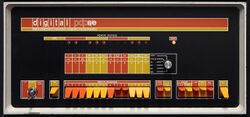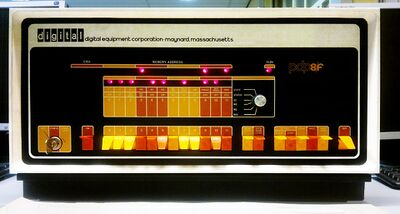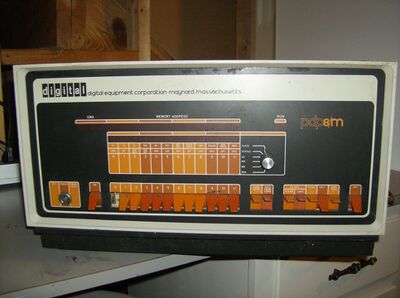Difference between revisions of "PDP-8/E"
(better image, +img of 8/F) |
(+ 8/M image) |
||
| Line 47: | Line 47: | ||
==Images== | ==Images== | ||
| − | [[Image:PDP-8' | + | [[Image:PDP-8'F_SimonClaessen.jpg|400px|PDP-8/F at Hack42 in Arnhem, The Netherlands]] |
| + | |||
| + | [[Image:PDP-8'M_BrianStuart.jpg|400px|PDP-8/M from Brian Stuart's collection]] | ||
==External links== | ==External links== | ||
| Line 53: | Line 55: | ||
* [https://ethw.org/First-Hand:PDP-8/E_OMNIBUS_Ride First-Hand:PDP-8/E OMNIBUS Ride] - PDP-8/E Design Story | * [https://ethw.org/First-Hand:PDP-8/E_OMNIBUS_Ride First-Hand:PDP-8/E OMNIBUS Ride] - PDP-8/E Design Story | ||
* [https://hack42.nl/wiki/Digital_PDP-8f Digital PDP-8F] | * [https://hack42.nl/wiki/Digital_PDP-8f Digital PDP-8F] | ||
| + | * [https://www.cs.drexel.edu/~bls96/museum/pdp8.html PDP-8/M Restoration Project] | ||
{{Nav PDP-8}} | {{Nav PDP-8}} | ||
[[Category: PDP-8s]] | [[Category: PDP-8s]] | ||
Revision as of 15:25, 9 January 2021
| PDP-8/E | |
 PDP-8/E front panel | |
| Manufacturer: | DEC |
|---|---|
| Architecture: | PDP-8 |
| Year Introduced: | 1970 |
| Form Factor: | minicomputer |
| Word Size: | 12 |
| Logic Type: | TTL |
| Design Type: | clocked random logic |
| Clock Speed: | 385KHz |
| Memory Speed: | 1.2 μseconds |
| Physical Address Size: | 32KW (requires optional KM8-E) |
| Virtual Address Size: | 4KW |
| Memory Management: | bank selection, CPU mode |
| Bus Architecture: | OMNIBUS |
| Operating System: | OS/8, TSS/8 |
| Predecessor(s): | PDP-8/I |
| Successor(s): | PDP-8/A |
| Price: | US$5K (CPU and 4KW memory) |
The PDP-8/E was an improved model in the PDP-8 line, and introduced the OMNIBUS for interfacing to device controllers.
The PDP-8/F was a cost-reduced version of the -8/E with the same CPU and core main memory, but only a single OMNIBUS backplane. The PDP-8/M is the OEM version of the PDP-8/F.
The -8/E's KK8-E CPU consists of five quad boards; the MM8-E core memory that was standard on the -8/E consisted of sets of three quad boards.
Options included:
- KA8-E Positive I/O Bus Interface, to allow use of older PDP-8 devices
- KM8-E Memory Extension and Time-Share Option, which was needed to support more than 4K words of memory, and allowed the computer to operate in either Executive Mode or User Mode
- MP8-E Memory Parity
- KD8-E Data Break Interface
- KE8-E Extended Arithmetic Element, which supported hardware integer multiplication and division, one-bit double-word shifts, and normalization
- FPP12-P and FPP12-AP Floating Point Processor (24+12 bits)
- FPP12-AE Double Precision option (FPP12-AP only, 60+12 bits)
It could perform an addition to the accumulator in 2.6 μseconds, and a 12 by 12 bit multiplication with 24 bit result in 40 μseconds, using the math extension hardware.
The -8/M could be supplied with either a KC8-M Operator's Console, or a KC8-ML Programmer's Console, the latter being basically identical to the KC8-EA Programmer's Console of the basic -8/E.
Images
External links
- First-Hand:PDP-8/E OMNIBUS Ride - PDP-8/E Design Story
- Digital PDP-8F
- PDP-8/M Restoration Project
| v • d • e PDP-8 Computers, Software and Peripherals |
|---|
| PDP-8s: PDP-5 • PDP-8 • LINC-8 • PDP-8/S • PDP-8/I • PDP-8/L • PDP-12 • PDP-8/E • PDP-8/F • PDP-8/M • PDP-8/A
Workstations: VT78 Also: PDP-8 family • PDP-8 architecture • PDP-8 Memory Extension units |

